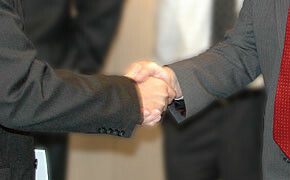Ingredients for an effective job search

Jun 7, 2013 | Career Services
This summer, college graduates are seeking their place in the work world, joining older adults seeking re-employment or a job transition.
Trying to convince a prospective employer is an inexact science, but Yvonne Duckett, director of the Career Center at Southern Wesleyan University shared tips for job seekers to stand out in a field of applicants.
Writing the Resumé
Duckett stressed that a resumé should be a brief summary of work history and abilities. Most employers will request one-page resumés. Highlighting education, communication skills, work experience, technical skills, leadership abilities and analytical skills are important, but the resumé should be customized to the position being sought. Prospective employers often scan resumés, rejecting those missing certain key words or containing typographical or grammatical errors. While a good resumé is important, Duckett adds that, in many cases, networking will actually get an applicant an interview before a resumé does, and a resumé is needed only to remind an employer about a job-seeker's background.
Research
Researching a prospective employer before an interview is a good start. Duckett suggests using as many resources as possible, but adds that just surfing the Internet isn’t enough.
“Other people are your greatest resources; therefore, networking activities provide valuable opportunities to practice sharing your skills with other people,” she said.
Job seekers should keep in mind that many prospective employers are conducting research of their own. They are viewing social media sites set up by the applicant, so posting anything embarrassing or questionable can eliminate applicants. Negative comments or sexually explicit pictures posted by the job seeker or friends can also have a negative reflection on the applicant.
Email and voice messages
When providing a prospective employer an email address, consider how it appears to them. For example, email addresses such as “johntheslacker1” or “hotbabe” might sound some alarms. Email signatures should also be professional in appearance. The same holds true for voice mail messages.
Interviewing
The first few seconds of a job interview are critical. Duckett added that first impressions can make or break the interview before the first questions are asked.
“Your handshake is the most important first impression you can make. It should say ‘I’m excited to be here, and I’m open to new experiences,’” Duckett said. For an in-person interview, she suggests dressing professionally, preferably in a suit; although women can wear blouses and slacks or skirts, and men can wear dress pants, button-down shirts and ties in many cases.
During a phone interview, make sure you are in a location where you can’t be interrupted, and, if on a cellphone, check your cell phone reception and make sure your phone battery is fully charged. When doing Skype interviews, or any interview involving a webcam, looking professional and confident is as important as it is for an in-person interview. Also, what’s seen in the background can be helpful or harmful.
Anticipate the kind of questions a prospective employer might ask during a job interview. The job seeker should practice interviewing with a friend or use the Interview Stream software that the SWU Career Services Center offers. In most cases, the interviewer will ask the job seeker if they have any questions. Duckett suggests having a prepared list of questions to ask the interviewer.
During the interview, prospective employers are demonstrating their communication and listening skills, whether they realize it or not. Duckett stresses that applicants should stay focused and avoid fidgeting or clock-watching. Cell phones should be completely off or left in the car. The job seeker should never take friends and relatives along with them to an interview.
After the interview
Although Duckett said that this is not true in every case, writing or emailing a note of thanks is worth the effort because it separates the job seeker from the other candidates.
Southern Wesleyan University Career Services has available a number of resources and programs to help you manage your career. Contact Yvonne Duckett at (864) 644-5150, e-mail or go online to www.swu.edu/careercenter. There are more job search tips on their Pinterest page: pinterest.com/swucareercenter.